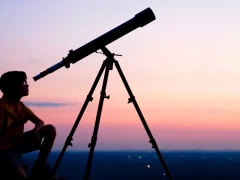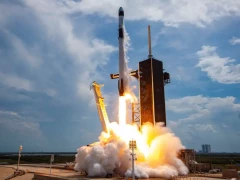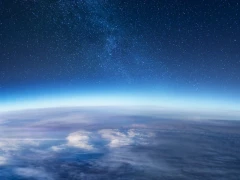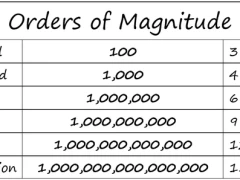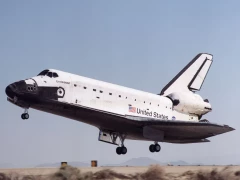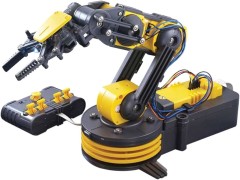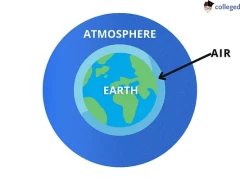Hubble [ˈhʌbl] n. 哈勃
telescope [ˈteliskəup] n. 望远镜
【扩】spyglass 小型望远镜
【搭】single-tube telescope 单筒望远镜
* * *
A: My father sent me a new telescope yesterday.
B: Is it a birthday present?
A:我爸爸昨天送了一个新的望远镜给我。
B:那是给你的生日礼物吗?
* * *
launch [lɔːntʃ] v. 发射
【搭】launch out 出航
* * *
A: I won't be surprised if the launch is scrubbed today.
B: But I don't think they will scrub it.
A:即使今天发射取消,我也不会感到意外。
B:但我认为他们不会取消的。
* * *
space [speis] n. 空间
NASA [ˈnæsə] n. (National Aeronautics and Space Administration) 国家航空和航天局
billion [ˈbiljən] n. 10亿
【扩】million 百万 thousand 千 hundred 百
* * *
A: They plan to spend five billion yuan on the project.
B: It's really a lot of money.
A:他们计划在这个项目上花费50亿元。
B:那确实是很多钱。
* * *
faulty [ˈfɔːlti] adj. 有错误的
* * *
A: Your reasoning on this point is faulty.
B: What's your opinion then?
A:你在这一点上的推论是错误的。
B:那你的意见是什么呢?
* * *
astronaut [ˈæstrənɔːt] n. 宇航员
shuttle [ˈʃʌtl] n. 航天飞机
* * *
A: The space shuttle is touching down.
B: Have they finished the task this time?
A:那架航天飞机正在着陆。
B:他们这次完成任务了吗?
* * *
Endeavour [inˈdevə] n. “奋进”号
robot-arm [ˈrəubɔt-ˌɑːm] n. 机器手
grab [ɡræb] v. 抓
【派】grabber 强取者
【扩】grasp 紧紧抓住
* * *
A: There is so much work left.
B: Yes, we need to grab some more people to help us.
A:还剩很多工作没做。
B:是的,我们需要再多找几个人来帮我们。
* * *
atmosphere [ˈætməsfiə] n. 大气层
distant [ˈdistənt] adj. 遥远的
【派】distantly 遥远地
【扩】distance 距离
* * *
A: I haven't seen this kind of things before.
B: It comes from a distant place.
A:我之前从来没见过这种东西。
B:它来自一个很遥远的地方。
* * *
galaxy [ˈɡæləksi] n. 星系
* * *
A: It is not in the middle of the galaxy, but rather near one edge.
B: Which book did you learn it from?
A:它不在星系中央而在边缘一带。
B:你是从哪本书里学到的?
* * *
universe [ˈjuːnivəːs] n. 宇宙
eagle eye [ˈiːɡl-ˈai] 鹰眼
noun [专属名词](Hubble)哈勃(美国天文学家) - At the edge of darkness, after about eight hours, I turned around and saw the Earth from our altitude at Hubble, 568 kilometers up.
noun [专属名词](Hubble)(美、英、加)哈布尔(人名) - On May 17, 2009, according to the plan, Mike Good and I would take a space walk to the Hubble Space Telescope to repair an instrument.
noun [专属名词]望远镜;射电望远镜,无线电望远镜(radio telescope 的简称) - The telescope has a magnification of 50. 这个望远镜可以放大50倍。
verb [vi. 不及物动词]叠套缩短,叠缩;缩短,精简;使(车辆)相撞而嵌进;压缩 - The telescope was pointing in the wrong direction.
verb [vt. 及物动词]发动,发起;上市,发行;使(船或舰)下水;发射(武器或宇宙飞船);启动(计算机程序);投出,用力扔出;使投身于(事业等);起飞,出海 - To launch a ship or a boat means to put it into water, often for the first time after it has been built.
noun [抽象名词](航天器的)发射;(产品的)上市;(事件的)发起;汽艇,游艇;(新产品,出版物)发布会,推介会 - his morning's launch of the space shuttle Columbia has been delayed.
launch a rocket / missile / satellite
noun [抽象名词]空间,空地;(用于特定目的的)处所,场所,空位;(公共汽车、火车等的)空座;开阔地,空旷处;开阔,空旷;空白,空隙;太空,外层空间;宇宙空间;一段时间;自由,自由支配的时间;(词语、行、段落的)间隔;(打字时的)空格,一个字母的宽度 - He needed space to be himself.
verb [vi. 不及物动词]在…之间留间隔,把…分隔开;(印刷或书写中)在(词语,字母,行)之间加空格;(尤指因无聊或吸毒后)变得昏昏沉沉,瞪着眼发呆 - Women once again are having fewer children and spacing them further apart.
room n. 空间(不可数);房间(可数)
- Could you make room for me? 你能为我腾一点空间吗?
noun [专属名词]美国国家航空和宇宙航行局(National Aeronautics and Space Administration) - NASA plans to launch a satellite to study cosmic rays.
numeral [基数词]十亿;<旧>万亿 - The new runway is a billion-dollar boondoggle.
noun [抽象名词]十亿;亿万,大量(billions) - Worldwide sales reached 2.5 billion.
adjective [原级]有故障的,有缺陷的;(思维方法)有错误的 - The money will be used to repair faulty equipment.
noun [专属名词]宇航员,太空人 - Astronaut Pierre Thuot tried to latch the 15-foot robotic arm onto the satellite.
noun [具体名词]航天飞机(space shuttle 的简称);往返于两地的交通工具,摆渡车;(英法之间英吉利海峡隧道的)穿梭火车(the Shuttle);(织机的)梭子;羽毛球(shuttlecock 的简称) - The space shuttle Atlantis returned safely to Earth today.
verb [vt. 及物动词]穿梭,往返;穿梭运送 - He and colleagues have shuttled back and forth between the three capitals.
verb [vt. 及物动词]努力,尽力 - They are endeavouring to protect trade union rights.
noun [抽象名词]努力,尝试;事业,活动 - The company's creative endeavours are thriving.
noun [专属名词]机器手 - The disabled can use robot-arm to do some simple movements.
verb [vt. 及物动词]攫取,抓住;(尤指匆忙地)取,吃,喝;霸占,强夺;利用,抓住(机会);引人注意,吸引 - I managed to grab her hand.
noun [具体名词]攫取,赚取;抓具,抓斗;抓取(或截获、采集)的图像 - Grab is also a noun.
noun [专属名词](包围地球或其他行星的)大气,大气层;(房间或其他场所内的)空气;气氛,环境;情调,感染力 - The atmosphere of a place is the air that you breathe there. (
adjective [原级]遥远的,久远的;冷淡的;心不在焉的;远亲的;不相似的,不同的 - He's a distant cousin of mine.
noun [专属名词]星系;银河,银河系(the Galaxy);群英,人才荟萃 - The Galaxy consists of 100 billion stars.
noun [专属名词]宇宙,天地万物(the universe);领域,体系;(已知宇宙以外的)宇宙 - If you talk about someone's universe, you are referring to the whole of their experience or an important part of it. (
noun [专属名词]鹰眼:敏锐的观察力或洞察力。 - Fulfill the Eagle Eye function in Electronic Chart Display System.

